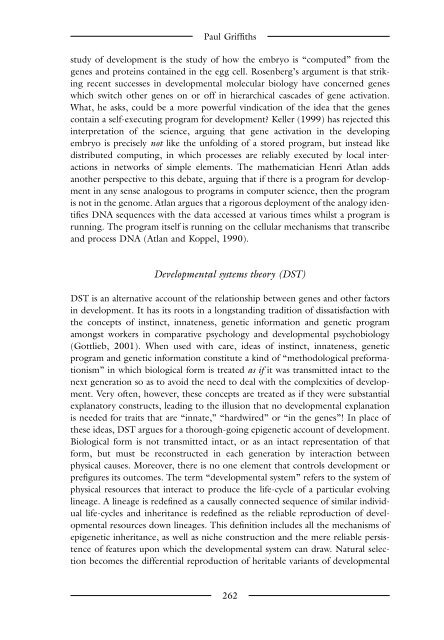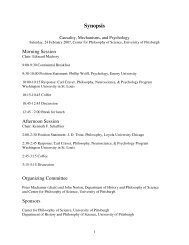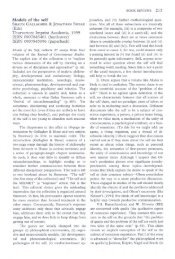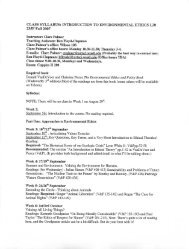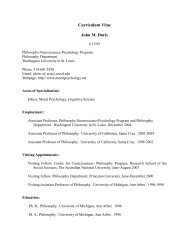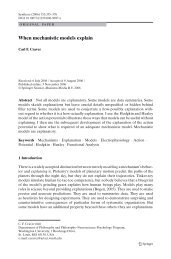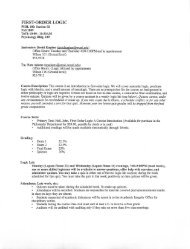The Blackwell Guide to the Philosophy of Science - The Department ...
The Blackwell Guide to the Philosophy of Science - The Department ...
The Blackwell Guide to the Philosophy of Science - The Department ...
Create successful ePaper yourself
Turn your PDF publications into a flip-book with our unique Google optimized e-Paper software.
Paul Griffiths<br />
study <strong>of</strong> development is <strong>the</strong> study <strong>of</strong> how <strong>the</strong> embryo is “computed” from <strong>the</strong><br />
genes and proteins contained in <strong>the</strong> egg cell. Rosenberg’s argument is that striking<br />
recent successes in developmental molecular biology have concerned genes<br />
which switch o<strong>the</strong>r genes on or <strong>of</strong>f in hierarchical cascades <strong>of</strong> gene activation.<br />
What, he asks, could be a more powerful vindication <strong>of</strong> <strong>the</strong> idea that <strong>the</strong> genes<br />
contain a self-executing program for development? Keller (1999) has rejected this<br />
interpretation <strong>of</strong> <strong>the</strong> science, arguing that gene activation in <strong>the</strong> developing<br />
embryo is precisely not like <strong>the</strong> unfolding <strong>of</strong> a s<strong>to</strong>red program, but instead like<br />
distributed computing, in which processes are reliably executed by local interactions<br />
in networks <strong>of</strong> simple elements. <strong>The</strong> ma<strong>the</strong>matician Henri Atlan adds<br />
ano<strong>the</strong>r perspective <strong>to</strong> this debate, arguing that if <strong>the</strong>re is a program for development<br />
in any sense analogous <strong>to</strong> programs in computer science, <strong>the</strong>n <strong>the</strong> program<br />
is not in <strong>the</strong> genome. Atlan argues that a rigorous deployment <strong>of</strong> <strong>the</strong> analogy identifies<br />
DNA sequences with <strong>the</strong> data accessed at various times whilst a program is<br />
running. <strong>The</strong> program itself is running on <strong>the</strong> cellular mechanisms that transcribe<br />
and process DNA (Atlan and Koppel, 1990).<br />
Developmental systems <strong>the</strong>ory (DST)<br />
DST is an alternative account <strong>of</strong> <strong>the</strong> relationship between genes and o<strong>the</strong>r fac<strong>to</strong>rs<br />
in development. It has its roots in a longstanding tradition <strong>of</strong> dissatisfaction with<br />
<strong>the</strong> concepts <strong>of</strong> instinct, innateness, genetic information and genetic program<br />
amongst workers in comparative psychology and developmental psychobiology<br />
(Gottlieb, 2001). When used with care, ideas <strong>of</strong> instinct, innateness, genetic<br />
program and genetic information constitute a kind <strong>of</strong> “methodological preformationism”<br />
in which biological form is treated as if it was transmitted intact <strong>to</strong> <strong>the</strong><br />
next generation so as <strong>to</strong> avoid <strong>the</strong> need <strong>to</strong> deal with <strong>the</strong> complexities <strong>of</strong> development.<br />
Very <strong>of</strong>ten, however, <strong>the</strong>se concepts are treated as if <strong>the</strong>y were substantial<br />
explana<strong>to</strong>ry constructs, leading <strong>to</strong> <strong>the</strong> illusion that no developmental explanation<br />
is needed for traits that are “innate,” “hardwired” or “in <strong>the</strong> genes”! In place <strong>of</strong><br />
<strong>the</strong>se ideas, DST argues for a thorough-going epigenetic account <strong>of</strong> development.<br />
Biological form is not transmitted intact, or as an intact representation <strong>of</strong> that<br />
form, but must be reconstructed in each generation by interaction between<br />
physical causes. Moreover, <strong>the</strong>re is no one element that controls development or<br />
prefigures its outcomes. <strong>The</strong> term “developmental system” refers <strong>to</strong> <strong>the</strong> system <strong>of</strong><br />
physical resources that interact <strong>to</strong> produce <strong>the</strong> life-cycle <strong>of</strong> a particular evolving<br />
lineage. A lineage is redefined as a causally connected sequence <strong>of</strong> similar individual<br />
life-cycles and inheritance is redefined as <strong>the</strong> reliable reproduction <strong>of</strong> developmental<br />
resources down lineages. This definition includes all <strong>the</strong> mechanisms <strong>of</strong><br />
epigenetic inheritance, as well as niche construction and <strong>the</strong> mere reliable persistence<br />
<strong>of</strong> features upon which <strong>the</strong> developmental system can draw. Natural selection<br />
becomes <strong>the</strong> differential reproduction <strong>of</strong> heritable variants <strong>of</strong> developmental<br />
262


